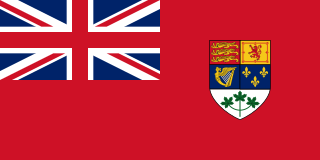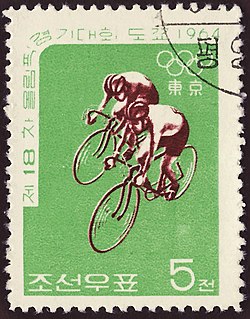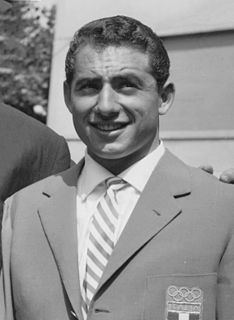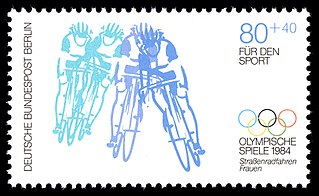
Australia competed at the 1952 Summer Olympics in Helsinki, Finland. 81 competitors, 71 men and 10 women, took part in 67 events in 12 sports. Australian athletes have competed in every Summer Olympic Games. As the country hosted the next Olympics in Melbourne, an Australian segment was performed at the closing ceremony.

Canada competed at the 1928 Summer Olympics in Amsterdam, Netherlands. 69 competitors, 62 men and 7 women, took part in 49 events in 8 sports.

France was the host nation for the 1924 Summer Olympics in Paris. It was the second time that France had hosted the Games, after the 1900 Summer Olympics, also in Paris. 401 competitors, 373 men and 28 women, took part in 128 events in 20 sports.

The United States competed at the 1920 Summer Olympics in Antwerp, Belgium. 288 competitors, 274 men and 14 women, took part in 113 events in 18 sports.

Finland competed at the 1912 Summer Olympics in Stockholm, Sweden. The Grand Duchy of Finland was part of the Russian Empire at the time, but Finland's results are kept separate from those of Russia. In the Opening Ceremony Finland's team paraded under the national insignia flag of a Swedish-speaking female gymnastics club in Helsinki. 164 competitors, 162 men and 2 women, took part in 49 events in 10 sports.

The men's track time trial was a track cycling event held as part of the Cycling at the 1964 Summer Olympics programme. It was held on 16 October 1964 at the Hachioji Velodrome. 27 cyclists from 27 nations competed, with each nation limited to one competitor. The event was won by Patrick Sercu of Belgium, the nation's first victory in the men's track time trial and first medal in the event since 1948. Giovanni Pettenella's silver medal put Italy on the podium for the event for the fourth consecutive Games, while Pierre Trentin's bronze was the first medal for France in the event since 1948.

The men's track time trial at the 1956 Summer Olympics in Melbourne, Australia, was held on Thursday 6 December 1956. There were 22 participants from 22 nations. Each competitor rode singly against the watch from a standing start. Competitors were allowed one ride only. The event was won by Leandro Faggin of Italy, the nation's first victory in the men's track time trial. Ladislav Fouček earned Czechoslovakia's first medal in the event with his silver, while Alfred Swift gave South Africa its second consecutive bronze medal.

The men's track time trial at the 1976 Summer Olympics in Montreal, Canada, was held on July 20, 1976. There were 30 participants from 30 nations, with each nation limited to one cyclist. One additional cyclist, Elmabruk Kehel from Libya, was entered but did not start because of the last-minute boycott from the African countries. The event was won by Klaus-Jürgen Grünke of East Germany, the nation's first victory in the men's track time trial. Michel Vaarten of Belgium took silver. Niels Fredborg became the only man to win three medals in the event, adding a bronze to his 1968 silver and 1972 gold.

The men's track time trial at the 1972 Summer Olympics in Munich, West Germany, was held on 31 August 1972. There were 31 participants from 31 nations, with each nation limited to one cyclist. One additional cyclist was entered but did not start. The event was won by Niels Fredborg of Denmark, the nation's first victory in the men's track time trial since Willy Hansen won in 1928. Denmark tied Italy and Australia for second-most gold medals in the event at 2. Fredborg was just the third man to win multiple medals in the event; he would become the only one to earn a third, in 1976. Daniel Clark's silver medal was Australia's first medal in the event since 1952. Jürgen Schütze's bronze was the first track time trial medal for East Germany as a separate nation.

The men's discus throw event at the 1932 Olympic Games took place August 3. Eighteen athletes from 11 nations competed. The 1930 Olympic Congress in Berlin had reduced the limit from 4 athletes per NOC to 3 athletes. The event was won by John Anderson of the United States, the nation's third consecutive and sixth overall victory in the men's discus throw. Henri LaBorde took silver, marking the first time since 1908 that the same nation had the top two discus throwers. Paul Winter was the bronze medalist, earning France's first discus medal. Finland's four-Games podium streak ended, while the United States extended its streak to all nine appearances of the event.

The men's track time trial cycling event at the 1932 Summer Olympics took place on August 1. Nine cyclists from nine nations competed, with each nation limited to one cyclist. The event was won by Dunc Gray of Australia, the nation's first victory in the men's track time trial. Gray was the first man to win two medals in the event, adding the gold to his 1928 bronze. Jacques van Egmond gave the Netherlands its second consecutive silver medal in the event. Charles Rampelberg of France took bronze, the nation's first medal since 1896.

The men's 1500 metres event at the 1952 Olympics took place between July 24 and July 26. Fifty-two athletes from 26 nations competed. The maximum number of athletes per nation had been set at 3 since the 1930 Olympic Congress. The event was won by Josy Barthel of Luxemburg; to date, this is the only Olympic gold medal won by a Luxembourger, though Luxembourg-born Michel Théato is credited for winning the 1900 Marathon for France. Germany won its first medal in the 1500 metres with Werner Lueg's bronze.

The men's track time trial cycling event at the 1936 Summer Olympics took place on 8 August and was one of six events at the 1936 Olympics. Nineteen cyclists from 19 nations competed, with each nation limited to one competitor. The event was won by Arie van Vliet of the Netherlands, the nation's first victory in the men's track time trial after two consecutive silver medals in 1924 and 1928. Pierre Georget's silver put France on the podium for the third time. Germany earned its first medal in the event with Rudolf Karsch's bronze.

The men's track time trial cycling event at the 1948 Summer Olympics took place on 11 August and was one of six events at the 1948 Olympics. Twenty-one cyclists from 21 nations competed, with each nation limited to one competitor. The event was won by Jacques Dupont of France, the nation's first victory in the event since 1896 and third consecutive podium appearance. Pierre Nihant earned Belgium's first medal in the men's track time trial with his silver; Tommy Godwin similarly took Great Britain's first medal in the event with his bronze.

The men's individual road race at the 1960 Summer Olympics in Rome, Italy, was held on 30 August 1960. There were 142 participants from 42 nations. Each nation could enter up to four cyclists. Of the 142 starters 76 rode the distance to the end. The event was won by Viktor Kapitonov of the Soviet Union, the nation's first medal in the event. Livio Trapè of Italy took silver, putting that country on the podium for the second consecutive Games. Willy Vanden Berghen's bronze gave Belgium its fourth medal in four Games.

The men's track time trial at the 1960 Summer Olympics in Rome, Italy, was held on 26 August 1960. There were 25 participants from 25 nations, with each nation limited to one competitor. The event was won by Sante Gaiardoni of Italy, the nation's second consecutive victory and third consecutive podium appearance in the men's track time trial. Dieter Gieseler won the United Team of Germany's first medal in the event in its first appearance with his silver; it was the first medal for a German athelte since 1936. Rostislav Vargashkin's bronze was the first medal for the Soviet Union in the event.

The men's track time trial at the 1968 Summer Olympics in Mexico City, Mexico, was held on 17 October 1968. There were 32 participants from 32 nations, with each nation limited to one cyclist. The event was won by Pierre Trentin of France, the nation's first victory in the men's track time trial since 1948 and third overall. In a sport where competitors rarely competed at more than one Games, Trentin was only the second man to win multiple medals in the track time trial. Niels Fredborg's silver medal was Denmark's first medal in the event since Willy Hansen's win in 1928; Fredborg would go on to be the only man to win three medals in the event. Poland earned its first ever medal in the time trial with Janusz Kierzkowski's bronze. Italy's four-Games medal streak in the event ended as Gianni Sartori took fourth.

The men's track time trial cycling event at the 1984 Summer Olympics took place on 30 July and was one of eight cycling events at the 1984 Olympics. There were 25 competitors from 25 nations, with each nation limited to one cyclist. Two other cyclists entered but did not start. The event was won by Fredy Schmidtke of West Germany, the nation's first victory in the men's track time trial and the third consecutive Games in which a German cyclist won. Curt Harnett earned Canada's first medal in the event with his silver, while France returned to the podium for the first time since 1968 with Fabrice Colas's bronze.

The men's track time trial cycling event at the 1988 Summer Olympics took place on 20 September and was one of the nine cycling events at the 1984 Olympics. There were 30 cyclists from 30 nations, with each nation limited to one competitor. The event was won by Aleksandr Kirichenko of the Soviet Union, the nation's first victory in the men's track time trial. Martin Vinnicombe's silver was Australia's first medal in the event since 1972, while Robert Lechner put West Germany on the podium for the second consecutive Games with his bronze.

The men's track time trial event at the 1980 Summer Olympics took place on 22 July 1980 in Moscow Olympic Velodrome. There were 18 competitors from 18 nations, with one additional cyclist entered but not starting. The event was won by Lothar Thoms of East Germany, the nation's second consecutive victory in the men's track time trial. Aleksandr Panfilov of the Soviet Union took silver, the nation's first medal in the event since 1960. David Weller's bronze remains—through the 2016 Games—Jamaica's only medal outside of track and field athletics. Denmark's three-Games medal streak ended.





















